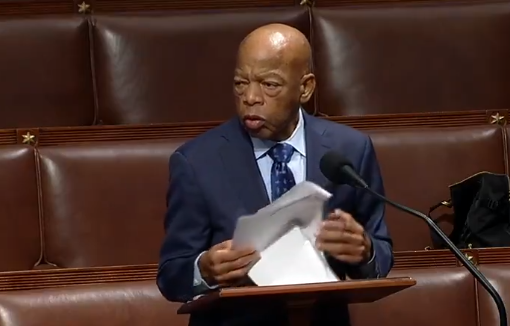3 former presidents mourn John Lewis at funeral in Atlanta
The arc of Lewis' legacy of activism was once again tied to Ebenezer's former pastor Martin Luther King Jr., whose sermons Lewis discovered while scanning the radio dial as a 15-year-old boy growing up in then-segregated Alabama. King continued to inspire Lewis' civil rights work for the next 65 years as he fought segregation during sometimes bloody marches, Greyhound bus “Freedom Rides" across the South and later during his long tenure in the U.S. Congress.

- Country:
- United States
John Lewis was mourned, revered and celebrated on Thursday at Atlanta's Ebenezer Baptist Church, a sacred place for many of those who helped to shape civil rights history. The arc of Lewis' legacy of activism was once again tied to Ebenezer's former pastor Martin Luther King Jr., whose sermons Lewis discovered while scanning the radio dial as a 15-year-old boy growing up in then-segregated Alabama.
King continued to inspire Lewis' civil rights work for the next 65 years as he fought segregation during sometimes bloody marches, Greyhound bus “Freedom Rides" across the South and later during his long tenure in the U.S. Congress. Lewis died July 17 at the age of 80. Former President Barack Obama attended Thursday's funeral and was expected to address mourners. Former President Bill Clinton and former President George W. Bush and former first lady Laura Bush also were in the church.
“Here lies a true American patriot who risked his life for the hope and promise of democracy,” Ebenezer's senior pastor, the Rev. Raphael Warnock, told the congregation as the funeral began. One of King's daughters, the Rev. Bernice King, led the congregation in prayer: “We will continue to get into good trouble as long as you grant us the breath to do so,” she said.
Outside Ebenezer, hundreds gathered to watch the service on a large screen outside the church. Some sang the gospel song “We Shall Overcome.” When Lewis was 15, he heard King's sermons on WRMA, a radio station in Montgomery, Alabama, he recalled in an interview for the Southern Oral History Program. “Later I saw him on many occasions in Nashville while I was in school between 1958 and '61," Lewis said. “In a sense, he was my leader.” King was “the person who, more than any other, continued to influence my life, who made me who I was," Lewis wrote in his 1998 autobiography, “Walking with the Wind." By the summer of 1963, Lewis was addressing thousands of people during the March on Washington, speaking shortly before King gave his “I Have a Dream" speech. He spoke then about Black people beaten by police and jailed — themes that resonate vividly in today's times.
“My friends, let us not forget that we are involved in a serious social revolution," Lewis told the huge crowd on the Washington Mall. “To those who have said, 'Be patient and wait,' we have long said that we cannot be patient," he added.
“We do not want our freedom gradually, but we want to be free now! We are tired. We are tired of being beaten by policemen. We are tired of seeing our people locked up in jail over and over again." In 1965, Lewis was beaten by Alabama state troopers in the city of Selma in what became known as “Bloody Sunday." Last Sunday, his casket was carried across the Edmund Pettus Bridge in Selma. The wagon rolled over a carpet of rose petals on the bridge that spans the Alabama River. On the south side of the bridge, where Lewis was attacked by the law officers, family members placed red roses that the carriage rolled over, marking the spot where Lewis spilled his blood and suffered a head injury.
Lewis was later awarded the Medal of Freedom by the nation's first Black president in 2011. He spent more than three decades in Congress, and his district included most of Atlanta.
Shortly before he died, Lewis wrote an essay for The New York Times and asked that it be published on the day of his funeral. In the piece published Thursday, Lewis recalled the teachings of King: “He said we are all complicit when we tolerate injustice," Lewis wrote.
“He said it is not enough to say it will get better by and by. He said each of us has a moral obligation to stand up, speak up and speak out." “Though I may not be here with you, I urge you to answer the highest calling of your heart and stand up for what you truly believe," Lewis added. “In my life I have done all I can to demonstrate that the way of peace, the way of love and nonviolence is the more excellent way. Now it is your turn to let freedom ring." As the funeral was about to begin Thursday morning, Kristina Watkins Mormino, a 50-year-old professor who lives in Lewis' congressional district, stood outside the church with her 11-year-old son James. They spoke of Lewis' passion for voting.
“For our family, voting is of the utmost importance," said Mormino, who is Black. “The fact that he kept on going at the bridge in Selma, that reminds me that whenever things are hard, just keep going,” her son James added.
(This story has not been edited by Devdiscourse staff and is auto-generated from a syndicated feed.)










